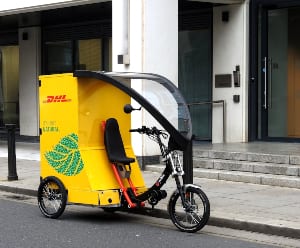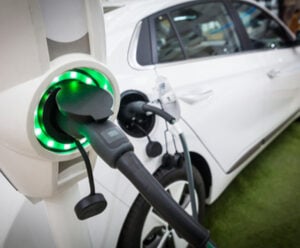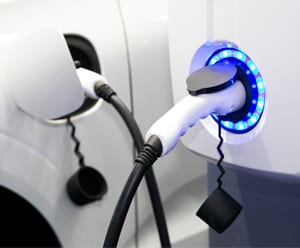
China is taking the wheel in the global growth of electric vehicles

As the world decarbonizes and pivots to electric vehicles (EVs), one country leads the way.
In 2023, China accounted for over half of the 9.5 million batteries in electric cars sold globally. It boasts the highest proportion of electric cars on the road, with one in four vehicles being battery-powered.
China’s leadership in EVs also extends beyond the domestic market. With significant export capacity, local manufacturers are seizing global opportunities. In 2023 alone, they exported 1.2 million EVs out of more than 4 million cars.
The country has also been ramping up battery production and export. Last year, its lithium-ion battery sector grew by 25 percent, with output value exceeding CNY1.4 trillion (€180 billion) and exports rising by more than a third.
This establishes China as an EV export powerhouse, led by automotive giants such as BYD and Tesla. While multiple factors drive China’s lightning-fast growth in the EV industry, it also comes with challenges that need to be addressed.
Powering up the EV market with the Shanghai EV Center of Excellence
Powering up the EV market with the Shanghai EV Center of Excellence
One of the key challenges behind China’s growing EV market is tapping into a robust and well-connected logistics network.
To that end, DHL Global Forwarding recently launched its Shanghai EV Center of Excellence, offering a fully integrated, end-to-end logistic solutions for EV and modular battery transportation. This includes domestic pickup with certified transportation service to and from various locations in China for export.
“Our deep understanding of the logistical complexities in the EV industry, coupled with our expansive global network, positions us to facilitate this next chapter of international expansion for Chinese EV firms,” said Niki Frank, CEO of DHL Global Forwarding APAC.
Warehousing facilities are certified EV-compliant, and managed by a qualified team for lithium-battery handling. It also facilitates reefer container charging, consolidation, transloading, short-term storage, and compliant, multi-modal international battery transportation, incorporating end-to-end temperature and humidity monitoring while batteries are moved to global Inbound-to Manufacturing (I2M) plants and aftermarket distribution centers.
These are some of the core strengths of DHL’s network across 50 warehouses in major commercial cities in China, guaranteeing timely collection and delivery. Partnerships with 100 subcontractors provide extensive logistics support and flexibility in handling transportation, warehousing, and distribution.
Driving the rise of EVs
Global decarbonization efforts and generous government support have driven the development of EVs in China. Buyer subsidies, tax breaks, and procurement contracts have spurred the rise of EV manufacturers, helping to propel demand from local customers.
Globally, EV battery demand soared to more than 750 GWh in 2023, a 40 percent increase from the previous year and benefiting China’s battery production.
Breakthroughs in battery technology, particularly in lithium iron phosphate (LFP), have further fueled growth. For many years, Chinese firms have led the development of LFP technology, which is considered safer and more affordable than certain other types of EV batteries. About 95 percent of LFP batteries for cars are now used in vehicles made in China.
Integrated value chain
The key to China’s success as an EV producer and exporter is its integrated value chain, which provides manufacturers easy access to everything they need – from various raw materials to batteries to digital services.
In battery production alone, the country provides many of the necessary resources. It locally produces raw materials such as lithium and graphite while relying on imports to supplement its supply chain. China also commands the largest share of the world’s refinery capacity for vital components such as cobalt and nickel sulfate. This advantageous position enables automotive makers to source batteries locally, boosting the viability of producing EVs in this market.
Likewise, the country’s expansive supply chain network has supported its EV industry growth. It has strong links to suppliers in various markets, which ensures a steady flow of resources essential for EV production. For its lithium supply, for example, it relies on imports from Australia, Africa, and Latin America for about two-thirds of the material. Chinese firms also have direct investments in lithium deposits in these countries to help secure supply.
Such a diverse network offers automotive makers the flexibility to adapt to changes in the global supply chain and maintain uninterrupted EV production while enabling them to export where demand is high.
Now, with immense production and export capacity, manufacturers in China are increasingly shipping EVs globally. They are expected to produce more than 36 million new energy vehicles, including EVs, and export 3.5 million of them in 2025.
Navigating emerging challenges
Despite its remarkable rise, China’s EV industry faces growing pains.
The growing dominance of Chinese EV makers and their impact on overseas competitors are starting to trigger protectionist policies from other countries and regions. For example, the European Commission initiated an anti-subsidy investigation into Chinese EV imports in October 2023. If the commission finds that Chinese manufacturers have unfairly benefited from subsidies, it may impose provisional tariffs on China EVs, ranging from 15 percent to 30 percent.
In the United States, customers will not receive tax credits when buying EVs with battery materials made in China and other strategic rival countries. On top of that, an upcoming increase in tariffs on Chinese EVs to over 100 percent is set to take effect in the United States from 1 August 2024. The new rules could negatively affect EV sales and reduce the competitiveness of Chinese manufacturers in the American market.
Empowering expansion with robust logistics
Enhancing export capabilities is crucial for supporting manufacturers outside China. A reliable logistics partner can ensure components and vehicles reach destinations promptly, meeting production schedules and customer demand without delays.
A key component to this is understanding the landscape of Dangerous Goods (DG), an area where DHL has specialists working with customers to ensure compliant movement of battery cells in line with relevant global and local dangerous goods regulations. “Through our global team of experts, we collaborate with our customers to design compliant, cost-efficient supply chains tailored to their needs. This is made possible as we use the combined knowledge of all our EV Centers of Excellence globally,” said Fathi Tlatli, President Global Sector Auto-Mobility at DHL CSI. On top of that, the logistics firm also deploys rail solutions for delivering EV powertrains, including last-mile delivery with sensor-tested humidity requirements, to ensure the batteries are moved safely.
At the tail end of the delivery process, storage and sorting solutions at arrival, including last-mile delivery using DHL's transport network at destination countries, can support and enhance the end-to-end exporting process. More importantly, DHL’s expertise in customs clearance can streamline the import and export process, and reduce the risk of complications at borders.
“As the logistics company for the world, we have the know-how in the trade policies and customs regulations of various countries. From documents, parts to raw materials, DHL is fully capable of providing stable and reliable logistics support for industry players in China to tap into the overseas market and help reinforce China’s standing in the global EV sector,” said Dongming Wu, CEO of DHL Express China.
Future growth
With demand soaring worldwide, manufacturers – both new entrants and established players, including Chinese and global companies – are increasingly looking to China as an EV powerhouse.
Its abundant resources, both on a local and partnership level, for manufacturing EVs and associated parts such as batteries, are crucial for companies to tap into China’s manufacturing capabilities.
EV manufacturers can successfully navigate the evolving industry by understanding market dynamics and adapting to changes in policies, shifts in customer preferences, and advancements in sustainable transportation technology. Strategic partnerships will be crucial for capitalizing on industry growth and strengthening their position in international markets.
ALSO WORTH READING
















 English
English